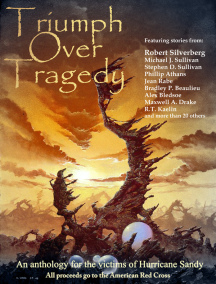Marian Allen's Blog, page 418
November 14, 2012
Super Sweet!
 Yeah, me! My pal Nancy Williams gave me this award and the beautiful badge that goes with it. Makes me hungry just to look at it.
Yeah, me! My pal Nancy Williams gave me this award and the beautiful badge that goes with it. Makes me hungry just to look at it.
Here are the rules for The Super Sweet Blog Award:
Answer a few questions about sweets. Pass it on to deserving bloggers.
1. What’s your favorite treat, cake or cookies?
CAEK! You take a piece of cake and nobody says a word. You take three cookies — much less than a piece of cake — and your mother says, “You’re eating three cookies?” So, yeah, cake.
2. Do you prefer chocolate or vanilla?
Chocolate, unless it has bits in. I like vanilla with bits of chocolate, nuts, peanut butter, and more chocolate. And more nuts. If there are no bits in it, I want it to be chocolate. Anything else is just a waste of calories.
3. If you had a sweet nickname what would it be?
Honey.
Sorry that last answer was so brief, but there it is. Honey. ‘Nuff said.
So now I pass this on to five other bloggers:
Denise Verrico – Immortyl Revolution featuring sexy Cedric
Judy Whelley – Sensuously Sixty (Am I detecting a pattern here?)
Shaunda Wenger – Slow Stir (she’s writing a cookbook, so this is a natural!)
Chris Miller – Confessions of a Logophiliac
Bob Sanchez – Writing, Reading, and a Bit of Travel
I’m looking forward to their answers!
Visitors, I welcome you to answer the questions, yourselves, in the comments here. 
A WRITING PROMPT FOR YOU: Answer the questions for a character, one of your own or someone else’s. For all the characters on NCIS, for example. 
MA

November 13, 2012
Trash To Treasure
Our church is replacing our old windows with new ones, because the old ones weren’t energy efficient. The old ones were swirly stained glass, kind of dark, actually. So we had all these old panes of glass, some broken, needing to be gotten rid of.
So we gave some to Zimmerman Art Glass Factory in Corydon, and they came up with these items for us. They’ll keep the glass in storage, and anybody who wants something made from that glass can order it done.
 We gave most of the rest to White Cloud Window. Artist/owner Roni Cravens said thank you by making this for us, now hanging in the entrance to the church:
We gave most of the rest to White Cloud Window. Artist/owner Roni Cravens said thank you by making this for us, now hanging in the entrance to the church:
I’m posting at Fatal Foodies today with Charlie’s squash recipe.
A WRITING PROMPT FOR YOU: A gift brings a better gift in return.
MA

November 12, 2012
Writing Good Dialogue
How do we go about writing good dialogue?
1. Professor James McKinley says, “To write…dialogue well, you must first know what the scene’s about, both in itself and as part of the work’s whole scheme, so that you can think and feel for and through the characters. Then you’re ready to write the words.” In other words, Plot + Character = Dialogue.
2. Dialogue should conform to the character of the speaker, sound natural in the circumstances, and should be significant to the story as a whole.
The best way to learn to write natural-sounding dialogue is to listen to the patterns of your own and others’ speech under various circumstances. How do you sound when you’re mad at someone you love? When you’re mad at someone you don’t know? How do people on the news sound when they’re talking about something they’ve thought about a lot? When they’re talking about something shocking or wonderful that’s just happened? I was once secretary to four men: I would type letters for each of them and take them in for signatures: One would say, “Put it on the desk.” One would say, “That’s fine. Thanks.” One would say, “Thank you! How nice! Aren’t you kind!” And one would say, “What took you so long?”
3. Remember that characters are talking to each other, not to the reader. Don’t have them tell each other things they already know, unless they do it in a natural way (listing grievances in the course of an argument, for example).
Make sure that they react to each other. Henry James is scary, he does this so well; everything any one character says is like a set of pebbles that sends different ripples through each other character in the scene. Remember that every scene is to some extent different to each character, because each character is the main character in his or her own mind. Each character is the main character in the story of his or her own life.
4. Leave out the small talk. Unless you’re trying to show that a conversation is boring, don’t put in all the conventions, fillers, social formalities and ritual exchanges. Go to the heart of the conversation.
5. Conversations aren’t always orderly and logical. Breaking off in mid-sentence, rambling, jumping from one topic to a topic only related by association can indicate character, intimacy between speakers, or intense emotion.
6. Sometimes dialogue is really two or more monologues running at the same time. Ed McBain was good at showing us different characters pursuing different lines of the story, then sitting over coffee together. One says, “There was another knifing in the park last night” and the man he’s talking to says, “Would you hit your mother with a raw fish if you’d had a bad day at the office?” That can be really funny, or really effective, depending on what echoes you set up within these disconnected conversations; if the reader knows that the serial killer is the man with the bad temper – you set the reader’s teeth on edge, willing the two to make the connection.
Plot + Character = Dialogue
A WRITING PROMPT FOR YOU: Practice your dialogue.
MA

November 11, 2012
#SampleSunday – Bit From Command Performance
My long-time internet pal Nancy Williams tagged me with TWO blog awards! This one doesn’t have a badge, but you know what they say about badges.
Tagged, you’re it! Who remembers that game? In this take, the requirement is to copy several paragraphs from your current manuscript with the word ‘look’ in it.
My current WIP doesn’t have the word “look” in it yet. The one I just submitted to an anthology about sidekicks does. So here are a few paragraphs from “Command Performance”:
A chill wind blew through the enclosed square and, when it stopped, a figure stood before Silvin. It looked like a man, but Silvin had a strong impression that the appearance was purely superficial. The figure was dressed as a beggar, bent and ancient, with a crooked back and ragged clothes. Filthy yellow-white hair hung in matted locks down his back.
When he spoke, his voice was harsh. “You’re the champion?” He looked Silvin up and down.
“I’m the what?”
“Who tells it this year?” The figure turned where he stood and swept the crowd with his dark regard. He pointed. “You.”
A woman, stone-faced with grief, stepped up to Silvin, looked him in the eye, and said, “Ten years ago, all the children were ill with the same sickness. We barred our gates, no one to go in or out, not wanting the illness to spread.”
“I remember hearing about it,” said Silvin. “My mother and father felt our foreheads for fever every time they passed us.”
“It was worse here than anywhere.”
The figure jostled the woman and, with a wave of his grimy hand, gestured her back into the darkness. “They couldn’t find a cause or a cure, so they blamed a stranger.”
“Blamed you right!” The drunken shout came from the back of the crowd. People drew away from the shouter, leaving him a clear path to stumble through. He reached the beggar and spat at his face. The spittle landed on the spitter, not on its target, and the beggar sneered.
The drunk wiped his face with his sleeve. He staggered back a step, then regained his ground and glared into the beggar’s face. “You come in here, talking about our sick children, and them getting sicker every day, like every word you drop is poison to them. Yes! I raised the town against you!” He waved an arm. The crowd pulled deeper into the shadows, as if to deny that involvement. “Yes! We hunted you down! Yes! We beat you to death right here.” He spat on the fieldstone that paved the square. This time, the contempt hit where it was intended. He wobbled on knees suddenly rubbery. His face lost its fury and melted into bewilderment. “But my babies died. And here you are. Again.”
And then it goes on.
I’m tagging:
Charmaine Clancy – Wagging Tales
Jennifer Burke – Jen’s Bookshelf
Carol Preflatish – Author of Romance, Mystery and Suspense
Stephen Tremp – Breakthrough Blogs
Jay Noel – Writer On Fire
A WRITING PROMPT FOR YOU: A character’s child is ill.
MA

November 10, 2012
Sorry, #Caturday Fans – Special Announcement!
I just learned that my short story “Undivided”, which originally appeared in Marion Zimmer Bradley’s SWORD AND SORCERESS XXIII, will be reprinted in R. T. Kaelin’s anthology TRIUMPH OVER TRAGEDY to benefit victims of Hurricane Sandy.
Many authors, including Robert Silverberg (!!!), are contributing reprints. R. T. is running an Indiegogo campaign. All money raised by the campaign and the anthology go through the American Red Cross to the relief efforts.
Here’s what R. T. says:
To date, I have 31 authors committed, 4 editors, and an illustrator. The author list as of this moment:

Click to see larger image.
• Robert Silverberg
• Michael J. Sullivan
• Bradley P. Beaulieu
• Phillip Athans
• Stephen D. Sullivan
• Rick Novy
• Jean Rabe
• Maxwell Alexander Drake
• Erik Scott de Bie
• Alex Bledsoe
• Matthew Wayne Selznick
• R.T. Kaelin
• Ari Marmell
• Jaym Gates
• C.S. Marks
• C.J. Henderson
• Marian Allen
• Bryan Young
• Donald Bingle
• Janine Spendlove
• T.L. Gray
• Miya Kressin
• Steven Saus
• Addie King
• Rob Knipe
• Vicki Johnson-Steger
• Tracy Chowdhury
• Doris Stever
• Gregory WilsonIf you are an author looking to contribute a story, feel free to contact me at rtkaelin@terrene.info. Or send me a message via Twitter @AuthorRTKaelin. Anthology details: 3-5k words in length (after all, we want to get this together quickly), genre independent, appropriate for all ages. As this will be an ebook only, total length of book will not matter. I’m guess we’ll be pushing 200k when all is said and done.
I’m so proud to be a part of this! And, considering that some of the victims are cat owners, cat lovers, and cats, maybe this is a Caturday post, after all.
A WRITING PROMPT FOR YOU: A character thinks of a way to help somebody with dignity for both the giver and receiver.
MA

November 9, 2012
Friday Recommends – Gleanings From Magna And Otherwhere
Are you still harping on Magna cum Murder? Yes, I am; now shut up! Magna is the last convention I’m going to this year, so I have to milk it for all it’s worth, all right?
First, allow me to introduce you to Jill Palumbo. This woman is a freakin’ genius! Her jewelry is, truly, Art. And she’s the sweetest, dearest, most imaginative person I’ve ever met. If you’re involved with any kind of festival or convention, see if she can come have a booth. She is AMAZING!
We met writing partners L. Barnett Evans and C. V. Rhodes, authors of the Grandmothers, Incorporated series. I bought both books in the series (so far) and can’t wait to read them!
We met Sheila Webster Boneham, author of the pet mystery DROP DEAD ON RECALL, which is about dogs, mostly. She plans a series of pet mysteries, using her background in animal photography as a springboard. They won’t all be about dogs and cats, which will be different and intriguing.
If you like historical fiction, head over to the Historical Fiction Authors Cooperative and check ‘em out. They’re categorized by time period, so you don’t have to wade through Ancient when you’re looking for Medieval.
Ellen Kuhfeld provided a beautiful excerpt booklet of her historical mystery SECRET MURDER: Who Shall Judge, set the days of the Vikings. It looks AWESOMESAUCE! Check it out at FTL Publications.
John Desjarlais has a short story collection out, which is good news all around. It’s BLOOD OF THE MARTYRS AND OTHER STORIES, available only on Kindle. I just bought it. 
Finally, if you’re a writer, pop over to the Nelson Literary Agency’s Resources page for links to important and useful sites for authors ready to market their work. While you’re over there, sign up for their newsletter.
A WRITING PROMPT FOR YOU: Read Ellen Kuhfeld’s excerpt. How does she establish a feeling of place and time without dumping information all over you?
MA

November 8, 2012
New Guy Pictures — The New Dog, I Mean
Well, the little dog who has been coming and going decided to stay. Our 11-year-old next-door #2 grandson really really really wanted him to, so we’re all delighted. #2 has been studying Greek history and mythology, so he named the pup Hector.
He thinks this is funny, since Hector was a big hero and the dog is miniscule. He doesn’t know an old saying that means “for a long time”: “Since Hector was a pup” as in “Oh, yeah, we go way back. I’ve known her since Hector was a pup.”
Here’s Hector:

What? What? You called me. What??
Oh, wait, that’s not a good picture. Let me try again:

Joetobomb
Thanks, Joe. ~sigh~ One more time:

Friend or vampire?
~deep sigh~ Okay, it looks like that’s as good as I’m gonna get.
#1 daughter and her husband let the pup sleep indoors at night and let him out during the day. He’s such a good dog! He (often) comes when he’s called, he’ll stay when he’s told to, he understands a simple No, he can Sit on command.

Joe likes him and plays with him, unless I pay too much attention to Hector. Then Joe growls at him and stays between us so Hector can’t come close to me. I’m thinking of buying Joe a suit and tie and some sunglasses. Maybe one of those wires snaking out of his ear.
So here’s a happy ending for a little dog lost. We have a feeling he got dumped, but he’s rolling in clover, now. 
A WRITING PROMPT FOR YOU: An old friend gets in the way of a new friendship.
MA

November 7, 2012
Charlie’s Black Bean Soup
Charlie is a big fan of soup — as, indeed, am I. He makes soup pretty much the way I do: This sounds good and that sounds good and we have some of this…. SOUP!
The other day, he made some really good stuff. He looked at a can of black beans with Southwestern Flavoring and saw a recipe on the back for black beans and rice, and thought that would be a good combination for soup.
“But,” he says, “I don’t know how long to cook rice.”
I sez, sez I, “Takes twenty minutes.”
Charlie: “I don’t know how much to use.”
Me: “Twice as much water as rice.”
Charlie: “What does that mean?”
Me: “…However much rice you use, use twice that amount of water.”
Charlie: “Smartass.”
But, between the two of us, we put together a good soup.
CHARLIE’S BLACK BEAN SOUP
1 can black beans with southwestern flavoring (or plain, if you don’t like cumin)1/3 cup rice4 cups waterchopped onion2 2-cup bouillon cubes1 can hominyCombine everything but hominy and bring to a boil. Cover and reduce heat. Simmer for 20 minutes. Add hominy and heat through.
Personally, I like a bit of garlic-flavored olive oil added, but that’s just me.
A WRITING PROMPT FOR YOU: Two characters cook together.
MA

November 6, 2012
More About Magna
I posted last week about Magna swag and part of the events and panels I attended there. Here’s the rest of my convention report:
When last we left my reminiscences, it was 11:25 am on Saturday, October 27, 2012. After my one panel, I sat at the far end of the signing tables. Astonishingly, I had a couple of people buy my books and ask for my autograph. I was very full of myself until I looked up and saw the length of the lines waiting for the other authors. Ah, well! I appreciated mine as much as they appreciated theirs, and that’s that!
At lunch, Terence Faherty interviewed Guest of Honor S. J. Rozan, author of the Bill Smith / Lydia Chin mysteries. We were amused to learn that her rare method of alternating novels told from each partner’s POV was accidental. Mom and I were disappointed to learn that the book of hers we read before coming to the convention, GHOST HERO, was uncharacteristic in its light tone and humor. We enjoyed it very much, and were looking forward to another similar one.
Then came my favorite part of Magna: the roundtable discussions. We begin with three authors sitting at a table, talking about writing. We might discuss our work, or somebody else’s work, the writing life, the writing process, marketing, editing…. Other people are welcome to join in, as listeners and participants, writers and readers. Every 15 minutes, one author is scheduled to leave and another to join. What usually happens is that more tables and chairs are crammed into the group, and we have one big running conversation for four hours.
Meanwhile, there was a panel on thrillers and one about using the past as “an active agent”. I missed both of those.
I tore myself away from the roundtable, though, to hear Luci Zahray (The Poison Lady) talk about alcohol as poison and antidote. I blogged about that last week at Fatal Foodies.
The banquet’s keynote speaker was Eric G. Wilson, author of AGAINST HAPPINESS: IN PRAISE OF MELANCHOLY. Naturally, your dear old MomGoth was enchanted. Here’s a quote from him: “To repress death is to lose the feeling of life. During gloomy pauses, we often discover parts of ourselves we never knew we possessed, talents that, properly activated, enrich our lives.”
Sunday, October 28, 2012
Two panels: Writing Murder, a panel by the authors of a book by the same name, essays on “the art and craft of mystery writing”. I bought the book. The other panel was Beyond Here Be Monsters, but it was about using international/exotic settings, not monsters, so bah.
Why Private Eye? was a wonderful panel of private eye writers. All of them had been private eyes or cops. All of them said the PI business was boring, and they didn’t really use much of their real-life experience. :/ Brandt Dodson told a great story about how he nearly got arrested four times within the course of one hour in Las Vegas, trying to do research for a novel.
Then, alas, the festival was over, and we had to come home. But we look forward to next year’s Magna cum Murder. Hope you join us there!
BTW, it’s Tuesday, so I’m posting at Fatal Foodies today on the subject of beer.
A WRITING PROMPT FOR YOU: A character gets into trouble trying to snoop.
MA

November 5, 2012
Dialogue – What Is It Good For?
Are we all singing Edwin Starr’s “War”? I know I am.
But dialogue IS good for something. It’s good for a lot of somethings, or it should be. If dialog doesn’t fulfill at least two of these purposes, it’s just yak-yak and it needs to be cut.
Dialogue, of course, is the sound of characters talking. It can be expressed in the equation: Plot + Character = Dialogue. Like characters, all dialogue should be genuinely functional. It should serve one of these purposes:
1. Show character – How much and in what way a character talks can tell a lot about him or her. Being a chatterbox or being tight-lipped. The kind of grammar used, the sort of words used, the style of speaking. The verbal response a character makes to a situation or to what another character has to say.
A common error in beginning writing is “They said”ing: “Uncle Joe walked into the room carrying a big box. ‘Hi, Uncle Joe,’ everyone said.” Chances are, each person in the room would say something different. “Hi, Joe” “What’s in the box” “Not you again” “You look beat” “Who’s that for” …depending on what they notice, who they are, and how they feel.
2. Advance action – Tim Sandlin says that, “Each conversation must end with some condition different from what it was at the beginning…. Your viewpoint character is in more trouble or thinks he is moving closer to the solution to the conflict.”
3. Give information – This can be done by one character telling another some news the reader needs to hear (“Chad broke his leg.”), or it can be done indirectly, with a character mentioning something in passing (“I drew a flower on Chad’s cast.”).
4. Set tone, voice – I know I’ve said it before, but different people, in different places, at different time periods, in different situations, in different sorts of books, will speak differently. One of my daughters used to say, “We ’bout cracked up,” when she meant she and her friends found something funny. Her dad objected. She asked what he wanted her to say instead. I suggested, “How we lahfed.” She didn’t consider that appropriate.
5. Break up long passages of narration – Solid blocks of description or background can be broken with passages of dialogue. A long speech by one character can be broken up by comments other characters throw in.
This dialogue, of course, should do more than break up the text with some quotes, but should have some function of its own – at least one of the other six purposes of dialogue.
6. Foreshadow – “This balloon is perfectly safe, so long as the anchor line is tied.”
7. Establish setting – “Chicago is great! The only thing I don’t like about this place is how cold it gets in the winter.”
A WRITING PROMPT FOR YOU: Write a scene in which every line of dialogue performs at least two of these tasks. Don’t worry if it’s silly; it’s just an exercise.







